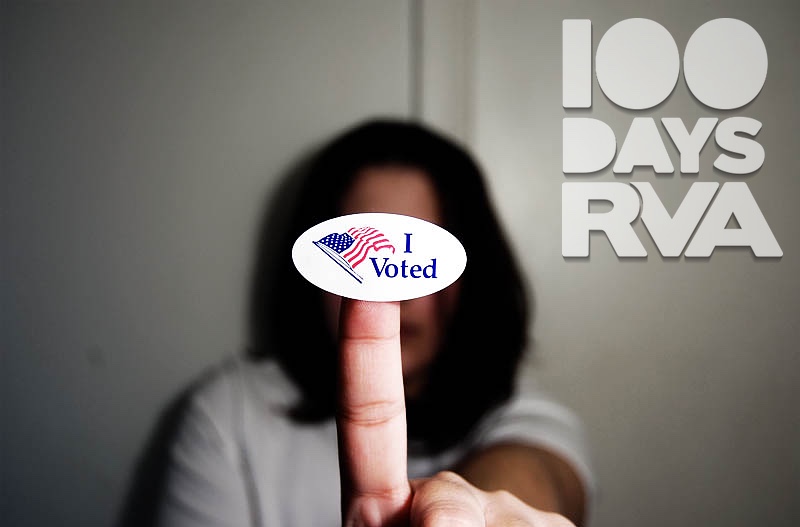Day #086: Same-day ID stations on Election Day
Why can’t increasing voter participation be a bipartisan issue?

Inspired by Michael Bierut’s 100 Day Project, 100 Days to a Better RVA strives to introduce and investigate unique ideas to improving the city of Richmond. View the entire project here and the intro here.
- Idea: Same-day identification stations at polling locations on election day.
- Difficulty: 3 — It wouldn’t be practical for this year, but it could work next year. Richmond would have to coordinate with the DMV because IDs are issued at the state level.
In exactly one week, millions of Americans will take to the polls to peacefully overthrow the government. Voting is one of the most important actions in establishing the legitimacy and direction of government, so it would seem that maximizing participation should be a unifying call. Unfortunately, voter participation has been a highly politicized issue since this nation’s founding.
The suppression du jour is Voter ID Laws. Virginia’s Voter ID Law will be in effect for the first time on Tuesday, November 4th. Richmond should create same-day ID stations at polling sites as a pragmatic approach to mitigating the suppressive consequences of the law.
Poll taxes
After the ratification of the 15th Amendment, certain states found ways to systematically prevent minorities from voting through Jim Crow laws. One of the main tools was poll taxes. In 1964, the 24th Amendment banned poll taxes. Voter ID laws are a roundabout way to reinstitute poll taxes, and a federal judge went as far as to say that when he recently struck down Texas’s comparable law.
Supply and demand theory tells us that raising the cost of anything will lower demand. Because of the ban on poll taxes, citizens can get free voter-ID cards. Economic theory also tells us there is more to cost than the sticker price. Getting an ID requires time, transportation, money for necessary documents, and time to acquire the knowledge to get the ID. Voter ID Laws raise the cost of voting. These laws disproportionately put a burden on those who do not have IDs which are usually the poor, elderly, or minorities.
Voter fraud
The increase in cost can only be justified under two conditions:
- If voter fraud were such a serious issue that it swayed elections or discounted the votes of legal voters.
- If voter ID laws effectively limited voter fraud.
The truth is, voter fraud is such a minuscule problem that it borders on myth and only a fraction of those cases could be prevented by voter ID laws. The benefit of combatting, somewhat ineffectively, voter fraud is so negligible it isn’t even worth comparing to the costs.
The fact of the matter is, voter fraud is not a serious issue. The Republican National Lawyers Association lists three incidents in the state of Virginia since the year 2000. One was a politicized residency complaint of a candidate in Petersburg. The second happened in Appalachia, Virginia. While it resulted in a two year prison sentence, it likely would not have been stopped by Voter ID Laws. The third was an individual who “willingly made a false statement by falsely indicating that one of her two residencies was her primary address” when it was not.
Overall, the NRLA lists 340 incidents over 10 years. That’s less than one incident per state per year. Keep in mind, more than a billion votes have been cast since 2000. The ratio of incidents to votes is tiny when compared to the blatant act of voter suppression which will affects numbers several magnitudes larger than 340.
— ∮∮∮ —
This issue will take time to be resolved by the courts1. These laws disproportionately affect minorities and low income individuals, which means they disproportionately affect Richmond. Local government should make an effort to decrease the costs of voting by creating same-day ID stations at all polling locations.
Individuals who visit DMV are able to receive a same-day temporary license with two proofs of identity and a proof of Virginia residency. Some individuals will still avoid the polls. Some individuals still won’t have the proper documents to get an ID, but it would lower the cost of voting, help individuals without ID get identification, and it would lower the political benefits of future ID laws aimed at limiting election day participation.
It’s a shame that boosting voter participation can’t be a bipartisan issue. High voluntary turnouts are fundamental to a healthy and legitimate republic. The only thing more disconcerting than those who simply don’t turn out to vote, are those who want to turn out and can’t because of suppressive legal hurdles.
Love this idea? Think it’s terrible? Have one that’s ten times better? Head over to the 100 Days to a Better RVA Facebook page and join in the conversation.
Photo by: jamelah
- Which is disconcerting if voter suppression swings elections. Judge appointments are highly politicized. If the beneficiaries of suppression win and shape the law, then the system will become self-perpetuating. ↩
-
Recommend this
on Facebook -

Report an error
-

Subscribe to our
Weekly Digest





There are no reader comments. Add yours.